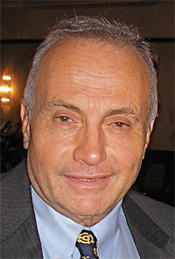New BAS Group Aims High

Richard Rudman
WASHINGTON
The question of adding engineering slots to the staffs of commissioners at the Federal Communications Commission has attracted the attention of a recently formed group called Engineers for the Integrity of Broadcast Auxiliary Services Spectrum.
Co-chaired by Dane Ericksen of Hammett & Edison and Richard Rudman of Remote Possibilities, the group would prefer a requirement that one commissioner actually be an engineer.
Ericksen said the original practice in which each commissioner had an engineer on staff was based on language in the Communications Act of 1934. "That provision allowed each FCC commissioner to appoint three professional assistants, outside of the Civil Service system, but one of those three assistants had to be an 'engineering assistant,'" he said. In 1982, when the number of commissioners was reduced from seven to five, that requirement was deleted.
UNBIASED TECHNICAL EXPERTISE
The group has written to Sen. Olympia Snowe, (R-Maine), about her bill, the FCC Commissioners' Technical Resource Enhancement Act, which would add an engineering or computer science staffer to each of the commissioner offices.
EIBASS suggests that Snowe set her sights too low. While it welcomes any development that would increase the unbiased technical expertise brought to FCC decisions, it argues that the commission needs an engineer in one of the five commission seats.
A commissioner without a technical background, even one supported by an engineering assistant, is not as effective as a commissioner with such experience, the group believes.
"We'd like to see engineers higher up in the FCC's decision-making process," said Ericksen, especially someone who can tell whether a spectrum-sharing proposal is likely to work. Some of the agency's recent spectrum-sharing proposals have serious flaws and the commission needs more engineering expertise, they feel.
"Unlike some attorneys, engineers know that the laws of physics are not subject to negotiation," said Rudman. He said EIBASS favors BAS sharing by compatible technologies if there is a reasonable technical basis to believe such sharing can work.
The group isn't picky; EIBASS doesn't necessarily seek to require that the "engineer" commissioner be a broadcast engineer or even an electrical engineer. A candidate with an engineering degree in any discipline, or professional registration in any discipline in any state, would qualify, (though this is a discussion that could set off debate itself, given the historical controversy within broadcasting over the definition of "engineer").
About EIBASS Ericksen said he and Rudman formed EIBASS to protect the BAS spectrum. The group has 11 members, mostly broadcast engineers. Its Web site is www.eibass.org.
Broadcast Auxiliary Services bands are all of the TV channels except Channel 37, plus 26, 160, 450/455 and 950 MHz, as well as 2, 2.5, 6.5, 7, 13 and 18 GHz.
Part 74, Subpart H, Low-Power Auxiliary stations, which includes wireless microphones, are allowed on all of the VHF and UHF TV channels, except for Channel 37, in order to protect radio astronomy. For the moment this means TV Channels 2–69, but as of June 12, 2010, LPA stations will be restricted to the in-core TV Channels 2–51.
Broadcasters use the 450/455 MHz bands for two-way communications with helicopters and ENG trucks. AM and FM radio stations use the 950 MHz and 18 GHz bands for aural STLs and intercity relays. TV stations use the 2 through 18 GHz bands for their microwave communications and electronic newsgathering (ENG).
Some private services share these pieces of the spectrum, such as police departments, which use some BAS bands for surveillance. For shared bands, broadcasters have co-equal priority, Ericksen said. Sharing for fixed links is generally on a first-come, first-served basis.
"The FCC is doing its best to accommodate new users of technology in bands that have traditionally been used for backstage purposes," said Rudman, noting the agency recently opened up the BAS spectrum to new uses, which has caused problems for broadcasters.
-- Leslie Stimson "What is important is that at least one FCC commissioner has a fundamental background in mathematics, physics and engineering that goes with attainment of an engineering degree or professional registration," said Ericksen.
COMMISSIONER ENGINEERS
In its letter to Snowe, the group suggests it would be better to resurrect H.R.3501, the Federal Communications Commission Engineering Sciences Qualification Act of 1991, which would establish a statutory requirement that at least one FCC commissioner be an engineer. Otherwise it's unlikely we'll again see a trained engineer on the FCC, EIBASS fears.
It notes that of the 80 commissioners who have served on the FCC, only eight were engineers. Further, with the exception of Charles Ferris—who had a physics degree, was professor for naval science and marine engineering at Harvard University and served as FCC chairman from 1977 to 1981—all past commissioner engineers were appointed prior to 1960, according to the group.
A steady decline of engineers on FCC staff also makes the issue a priority, says EIBASS. It said that in 1948 the FCC employed 720 engineers out of a total of 1,380 employees and had an annual budget of $6.2 million. Today the FCC has just 273 engineers out of 1,899 employees and an annual budget of $339 million, the group states.
A recent report to Congress by the Government Accountability Office also notes the declining number of engineers. From 2003 to 2008, it says, the number dropped by 10 percent, from 310 to 280. Further, the GAO says, the FCC estimates 45 percent of supervisory engineers are projected to be eligible for retirement by 2011; while the agency has begun hiring engineers to replace those retiring, "most hires have been at the entry level."
The GAO stated, "Of the 53 engineers hired in fiscal years 2007 and 2008, 43 were entry-level hires. During this same period, 30 engineers retired. Stakeholders stated that recent graduates sometimes have little experience or understanding of how policies affect industry. Increasing the number of staff with backgrounds and experience in industry would help improve FCC's understanding of industry issues and can lead to better policies, according to stakeholders."
The professional video industry's #1 source for news, trends and product and tech information. Sign up below.
